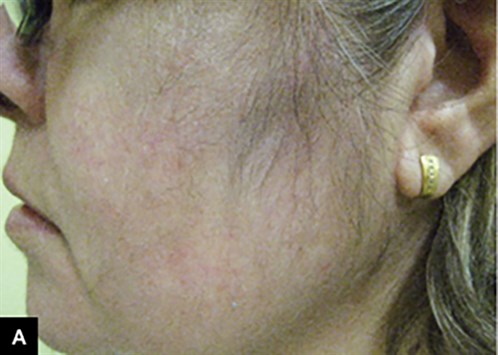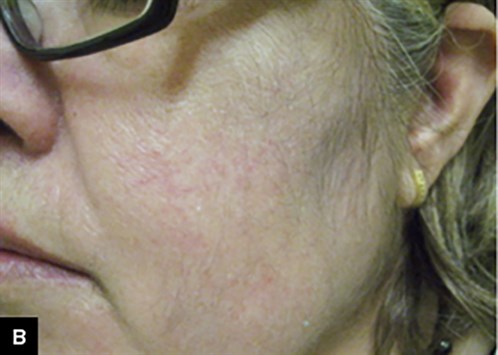Case
A woman, 47 years of age, with chronic plaque-type psoriasis for the past 18 years but otherwise healthy, presented complaining of facial hair growth three months after starting systemic cyclosporine therapy (3.5 mg/kg/day). The patient had been previously treated with topical agents and narrowband ultraviolet B (NB-UVB) phototherapy. On physical examination, she had marked facial hair growth and improvement of psoriasis severity (Figure 1). No other skin lesions or symptoms were detected.


Figure 1. Clinical appearance of patient’s facial hair
Question 1
What is the pathogenesis of this phenomenon?
Question 2
What is the most likely aetiology for hypertrichosis in this patient?
Question 3
Are there other possible side effects?
Question 4
How would you manage this patient?
Answer 1
Hypertrichosis is excessive hair growth on any part or whole of the body, compared with people of the same age, sex and racial group.1 The underlying pathogenesis remains unknown.2,3 Hypertrichosis is usually classified as generalised or localised. Each of these types is further divided into congenital and acquired subtypes.1 It can be a manifestation of a more general medical problem. The possible causes of acquired hypertrichosis are summarised in Table 1.1
Table 1. Possible causes for acquired hypertrichosis
|
Congenital generalised
|
Congenital hypertrichosis lanuginose Universal congenital hypertrichosis
|
|
Acquired generalised
|
Hypertrichosis lanuginosa associated with malignancy Endocrine disorders (eg thyroid disorders and disorders of diencephalon or pituitary)
Malnutrition (eg celiac disease, anorexia nervosa)
Drugs (eg phenytoin, acetazolamide, cyclosporine, penicillamine)
|
|
Congenital localised
|
Melanocytic naevi
Lumbosacral hypertrichosis
|
|
Acquired localised
|
Becker’s naevus
Porphyria cutanea tarda
Trauma
Infection
Inflammation (areas overlying thrombophlebitis or chronic osteomyelitis or vaccination sites)
|
Hypertrichosis must not be confused with hirsutism, which is defined as androgen-induced growth of terminal hair in women and children, in a male pattern distribution. Hirsutism is androgen-dependent, whereas hypertrichosis is not.1
Answer 2
The most likely aetiology for hypertrichosis in this patient is cyclosporine therapy. Cyclosporine is an effective drug used for the treatment of psoriasis.4–6 It is an immunomodulating agent that binds to cyclophilin, a cytoplasmic protein. Cyclosporine interrupts the signalling pathway for interleukin-2 production and inhibits the proliferation of cluster of differentiation 4 (CD4) T-lymphocytes.7 One possible mechanism for hypertrichosis may be the expression of several growth factors and production of other cytokines.2,4
Hypertrichosis is one of the most common side effects of systemic cyclosporine therapy, although there is considerable variability in the reported incidence.8 It is a dose-dependent phenomenon and usually noted a few months after cyclosporine therapy begins.1 Other possible indications for cyclosporine include rheumatic diseases (eg rheumatoid arthritis), ulcerative colitis and various other immune-mediated diseases. Cyclosporine is also the backbone of immunosuppression in transplant recipients, particularly those with renal transplants.3
Answer 3
There are other cutaneous side effects of cyclosporine, such as epidermal cysts, keratosis pilaris, acne, folliculitis and sebaceous hyperplasia.8 The other side effects are summarised in Table 2.
Table 2. Side effects of systemic cyclosporine therapy
|
Cutaneous
|
Hypertrichosis, epidermal cysts, keratosis pilaris, acne, folliculitis, sebaceous hyperplasia
|
|
Cardiovascular
|
Hypertension, hyperlipidemia (particularly hypertriglyceridemia)
|
|
Renal
|
Nephrotoxicity
|
|
Neurologic
|
Paresthesia, hyperesthesia, headaches, seizures, psychosis, tremor
|
|
Gastrointestinal
|
Nausea, vomiting, diarrhea, anorexia, abdominal discomfort, hyperbilirrubinemia
|
|
Other
|
Gingival hyperplasia, hyperuricemia, hypomagnesemia
|
Answer 4
Cessation of cyclosporine therapy results in a progressive resolution of the induced hypertrichosis.3,9 The decision to discontinue systemic treatment should include a risk–benefit assessment for that particular patient. The patient’s psoriasis will probably be aggravated following cyclosporine cessation. Other possible systemic treatments can be considered on a case-by-case basis. These systemic treatments include methotrexate, acitretin or biological agents (anti-TNFα, anti-p40 e anti-IL17).10
When it is not possible to stop cyclosporine, hypertrichosis can be managed by physical methods (eg plucking, waxing, shaving), chemical depilation, laser sources or pharmacological treatment with topical eflornithine.1
Key points
- Hypertrichosis is one of the most common side effects of systemic cyclosporine therapy. It is dose-dependent and usually noted a few months after beginning therapy.
- Cessation of cyclosporine results in a progressive resolution of the induced hypertrichosis.
Authors
Rita S Matos MD, General Practice trainee, Unidade de Saúde Familiar São Bento – Agrupamento de Centros de Saúde de Gondomar, Portugal. anasotam@gmail.com
Tiago Torres MD, PhD, Dermatologist, Department of Dermatology and Dermatology Research Unit, Centro Hospitalar do Porto; Instituto de Ciências Biomédicas Abel Salazar, University of Porto, Portugal
Competing interests: Outside this work, Tiago Torres has received payment from Pfizer, Abbvie, Novartis, Janssen, MSD, Leo-Pharma and Lilly for board memberships, consultancy, expert testimony and speaking engagements. He has also received grants from MSD and Leo-Pharma; and Pfizer, Abbvie, Novartis, Janssen, MSD and Leo-Pharma have covered expenses.
Provenance and peer review: Not commissioned, externally peer reviewed.